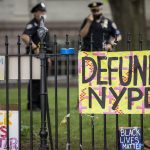Recent events have drawn attention for calls for major police reform, but what about public health?
Harold Pollack,
Below is an excerpt from the article.
Public health prevention activities are boring, under normal circumstances, for many reasons. They mainly help diffuse, unidentified constituencies. When they work properly, they are basically invisible. We don’t call up to thank the health department when we eat a pork chop without getting sick, or when we have sex without contracting chlamydia. Meanwhile, acute medical services vividly serve identifiable human beings in desperate need—and who receive that help through some of the most well-financed and influential institutions in American life. It’s the way of the world that fancy lung cancer therapies will always receive greater attention and political support (not to mention the most generous insurance reimbursement) than some smoking cessation helpline that costs maybe 1 percent as much.
It’s only when emergency strikes that public health takes center-stage, whether it’s been adequately funded or not. In that terrifying moment, monies will flow. Yet as Columbia political scientist Larry Brown observes, the accompanying political urgency proves impatient and fleeting. Facing a crisis, we focus on mounting an effective immediate response, not on preparing a solid infrastructure that will ready us for the next crisis, after the spotlight has faded.





